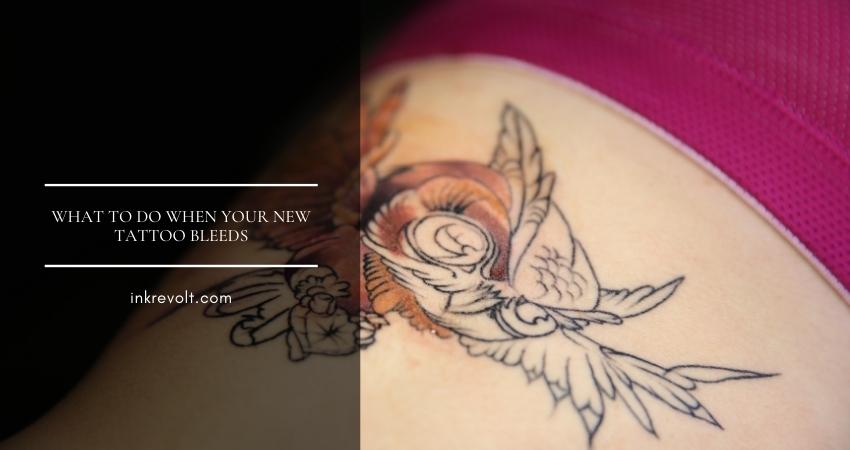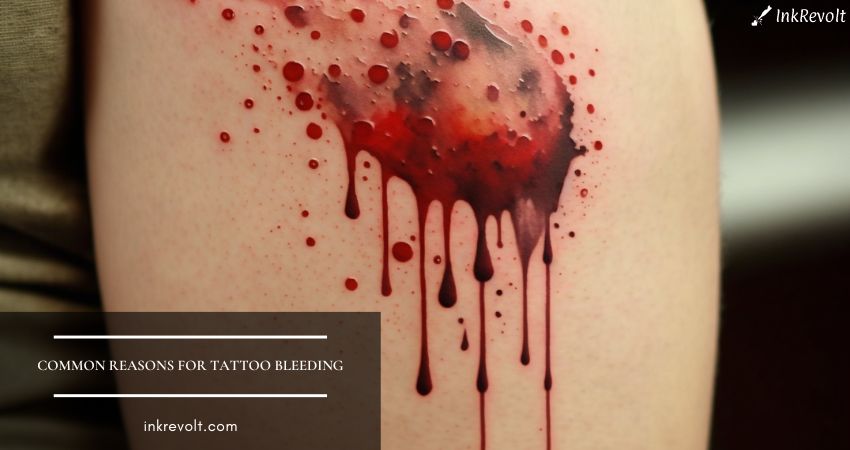Tattoo Bleeding: Why It Happens and How to Fix It
The sight of your blood is a universal sign of trouble. But when you’re getting a new tattoo, it’s part of the process. Bleeding is expected during and after the process, but maybe you’re still bleeding days after. So, what to do when your new tattoo bleeds?
New tattoos will bleed for up to 36 hours, so giving them time to heal is the best option. If your tattoo is bleeding after 48 hours have passed, it can be caused by blood thinners in your system, exercise, friction, lack of hygiene, and poking or prodding the tattoo.
To stop the cause of bleeding, or in extreme cases like infections and medication adjustments, consult your doctor immediately.
New tattoos bleeding is normal, and you have to give it time. But if you’re bleeding too much or for too long, you need to find the cause and stop it immediately. I’ve explained the most probable reasons and what to do in this article.
Why Does My Tattoo Bleed at all?

A tattoo is essentially a collection of micro stabbings or wounds. Ink’s injected into your skin this way to color your skin, and a tattoo is produced. During the process and while it heals, it’ll bleed like any other cuts.
Getting a tattoo from a skilled artist will reduce the amount of bleeding. But since your skin has had to endure the process, it won’t be able to heal as fast as it normally would. So, for about 16 to 36 hours, you will see blood, ink, and plasma ooze out of your tattoo.
If you bleed up to 36 hours or so, you might naturally heal slower than others. Some people recover slower than others due to physiological conditions. You can also affect your healing negatively with your habits and medication.
Common Reasons for Excessive or Prolonged Bleeding
Aftercare is paramount after you get a tattoo. A new tattoo is very sensitive, so you can’t simply ignore it and go about your day. In most cases, ignoring simple aftercare practices will cause bleeding.
Here are the common causes why you can bleed more or longer than normal.
- Taking blood thinners.
- Exercising.
- Causing friction against the tattoo.
- Ignoring hygiene.
- Scratching or poking the tattoo.
Blood Thinners
Some compounds can cause your blood to “thin out.” You’ll bleed more during and after the tattoo process as a result. Simple things like taking your medication and drinking alcohol can cause this issue.
Of course, your blood doesn’t actually get thinner. Depending on how each compound reacts in your body, blood thinners will slow or stop coagulation. So, your blood won’t congeal and form a seal over wounds as easily.
For medications, the most common type of blood thinners you take is antiplatelets. These affect the platelets in your blood, preventing them from sticking to each other and forming any seals. Antiplatelets are the weaker variant, but your regular painkillers like Aspirin are of this kind.
Alcohol has a similar effect, but it can affect you more aggressively than painkillers. Alcohol affects coagulation in two ways.
- It prevents the platelets from releasing sealing proteins that are needed to seal over wounds.
- It also lowers the platelet count in your blood.
Normally, drinking alcohol won’t affect you as badly if you cut yourself. But a newly tattooed skin is too compromised and has lots of openings for blood to leak. Slowing the coagulation even by a bit would affect the healing greatly.

Exercising
Moving or exerting yourself after getting a new tattoo can cause excessive and prolonged bleeding. If you exercise after getting a tattoo, you’ll reopen the scabs and cause bleeding.
The most popular places to get tattooed are the biceps, upper arm, and forearms. Your arms are extensively used for the upper torso, core, and many full-body exercises. Chest and back are less popular picks, but a tattoo on these regions will also be affected by exercise.
To heal and stop bleeding, your blood will coagulate and form light scabs across your tattoo. If you work out, you stretch and compress the skin, causing the scabs to be torn out. This effectively reopens the wound, and you bleed out.
Stressing the skin like this will also damage the tattooed area more. You can widen the wounds and tear up your skin pretty badly. You might end up with a deformed tattoo on top of excessive bleeding.
Friction
Friction has a similar effect to exercising. The tattooed skin is quite tender, and the scabs can come out. Causing the slightest bit of friction against the scabs can rip them off, and you might not notice till it’s too late.
If you wear clothing over the new tattoo, it can cause friction. The clothing will rub against it when you move around. Clothes with rougher fabric or tight clothing will cause more friction.
If your tattoo is itching or leaking fluids, you can rip off the scabs accidentally. Wiping the tattoo too hard or rubbing too vigorously will cause enough friction too.
Ignoring Hygienic Practices
Just like any open wound, a tattoo provides easy access for bacteria and germs to your body. Your skin is the first and strongest layer of protection against bacteria and germs. Tattooing will pierce up to the second layer of the skin, breaching this protection.
You can infect your new tattoo if you’re not careful enough. Touching the area without sanitizing your hands is a big reason that many ignore. Also, not washing the area and refusing to apply antibacterial cream will cause infections as well.
If your tattoo is infected, you’ll notice the following symptoms.
- Itching and burning.
- Swelling.
- Pus buildup.
- Feverish feeling.
- Pungent odor.
- Skin decolorization or turning greenish or yellowish.
Infections will prevent your skin from healing and cause serious health issues over time. And your tattoo will bleed excessively if it’s been infected.
Fiddling With the New Tattoo
If you keep poking or prodding your new tattoo, you’ll agitate the skin. Irritating the skin too often can cause it to break or tear, and scabs can come off. You can forget to sanitize if you touch your tattoo so many times, so it can lead to infections as well. Also, people around you might poke or touch it, and cause the same issues.
How To Stop Tattoo Bleeding?
I’ve already told you what issues can cause bleeding. But, what to do when your new tattoo bleeds and you need an immediate solution? If your tattoo is bleeding excessively, or past the 48-hour mark, you can try the following.
- Pin down the exact reason why your tattoo is bleeding. Whatever habit caused it, stop it immediately.
- Use a paper towel, or a soft disinfected cloth to gently pat off the blood. Apply an antibacterial cream. Hold the tattooed section above your head if possible.
- If it’s torn up or infected, seek medical help immediately.
- If you’ve drunk alcohol in the last 48 hours, then refrain from drinking any more. Wait until the alcohol is flushed out of your system.
- If you take any painkillers or medicines that have blood-thinning properties, talk to your doctor.
- Also, if you’ve got any blood disorders, seek medical assistance immediately.
How to Prevent Tattoo Bleeding?
Best case scenario, you don’t bleed much in the first place. If you want to prevent bleeding as much as possible, then you should prepare for before and aftercare.
Before Getting the Tattoo
You can prepare ahead of getting your tattoo. Here are some steps to lower the bleeding.
- Stop drinking alcohol 24 to 36 hours before getting tattooed.
- Check with your doctor if you take painkillers or have other medications that are blood thinners. Ask to swap or stop the medicine for two weeks or more.
- Get a good night’s rest and eat a hearty meal before getting tattooed. This will better your endurance and recovery.
- If you’ve got any medical conditions such as diabetes, or any blood disorders, talk to your doctor. Discuss whether getting a tattoo is safe at all.
Aftercare to Stop Bleeding
You can follow these steps to reduce and stop the bleeding after getting the tattoo.
- Remove the bandage by 24 hours. It can get stuck to your skin and pull out the scabs otherwise.
- Use a mild, antibacterial soap to wash the tattoo after 8 hours have passed.
- Never rub on the skin. Pat the skin dry with soft, clean fabrics or paper towels.
- Apply an antibacterial cream to the area.
- Keep the area moisturized so it doesn’t crack and bleed. You can use Polysporin, Neosporin, Lanacane, Keri Lotion, and vitamin E oil.
- Don’t use petroleum jelly to cover it. You’ll suffocate the skin and cause any bacteria and germs to nest under your skin.
- Don’t smother the area with too much cream or gel.
- Don’t point a showerhead or jet directly at the tattoo. It can rip off the scabs and cause bleeding.
- Don’t drink for at least 48 hours after getting the tattoo.
Final Words
If you’re panicking about what to do when your new tattoo bleeds, don’t freak out right away. Some bleeding will happen, so don’t panic, and give it time. Even if you feel that it might be bleeding too much, just spotting the cause and preventing it can stop the bleeding.
However, if you take medications or have conditions that cause excessive bleeding and you haven’t talked to your doctor, do it right away. Don’t try to fix the issue by yourself or wait. Also, don’t think you can’t get a tattoo if you do have any issues. With prior consultation and good aftercare, you can get a tattoo.
